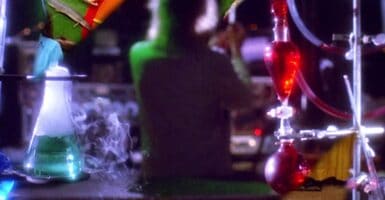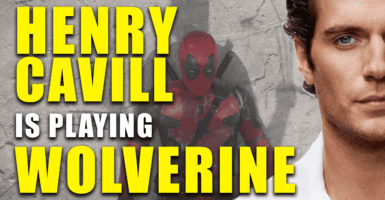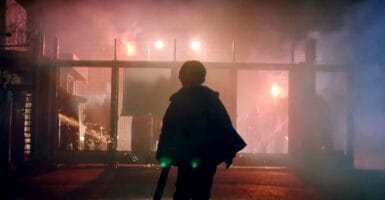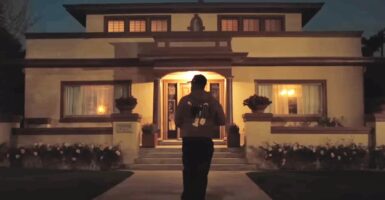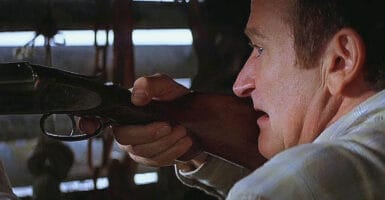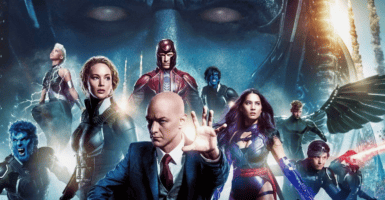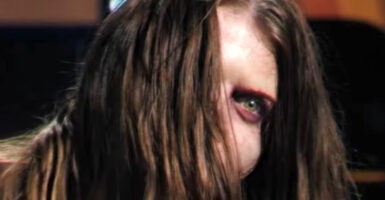The Walking Dead: Robert Kirkman Talks Mid-Season Finale And Beyond
This article is more than 2 years old
 This past Sunday, AMC’s hit zombie drama The Walking Dead wrapped up the first half of their fourth season with “Too Far Gone.” Maybe the strongest episode of the season—I’ve heard from multiple people who have stopped watching the series, but tuned in for this chapter only to be pleasantly surprised—it definitely provided one hell of a sendoff for a three-month hiatus. You should probably stop reading now if you haven’t watched “Too Far Gone” yet, but Robert Kirkman, creator of the comics and executive producer of the series, took a moment to talk about the mid-season finale, and what lies ahead for the characters, this season and beyond.
This past Sunday, AMC’s hit zombie drama The Walking Dead wrapped up the first half of their fourth season with “Too Far Gone.” Maybe the strongest episode of the season—I’ve heard from multiple people who have stopped watching the series, but tuned in for this chapter only to be pleasantly surprised—it definitely provided one hell of a sendoff for a three-month hiatus. You should probably stop reading now if you haven’t watched “Too Far Gone” yet, but Robert Kirkman, creator of the comics and executive producer of the series, took a moment to talk about the mid-season finale, and what lies ahead for the characters, this season and beyond.
One thing The Walking Dead is known for is skipping large chunks of time between seasons. For those of you worried they might pull something similar within the 16-episode season, fear not. Kirkman tells TV Guide that, “There’s no time jump. We wouldn’t do that. It’s going to pick up pretty much to the minute of where we left off.” That will be a relief to fans. With so many key deaths, the group split into various shards, and dangling story lines, it would drive you crazy if they attempted to leap ahead any significant length of time.
We spent two straight weeks catching up with the Governor (David Morrissey), and after more than a season—and a much longer time span than in the comics—he finally goes down in an appropriately violent manner. One of the reasons for extending his stay, other than the fact that fans like him for some reason, was that they needed a way for the situation at the prison to come to a head. The Governor causes the fall in the comics, and though he takes the roundabout way—even delving into Kirkman’s novel The Rise of the Governor—he performs the same function in the series.
Michonne (Danai Gurira) has been obsessed with revenge against the Governor all season long, but how will she react to finally achieving her goal? You don’t simply get retribution and go back to the way things were. Such endeavors leave an indelible mark. Kirkman says, “That’s definitely something we’re going to be dealing with in the back half, but I’m pretty sure she’ll find out that you don’t quite get as much closure from those things as you think you will. She’s still going to have quite a bit of that tormenting her.”
That will be interesting to see. Michonne is such an interesting character in the comics; guarded, tough, but also surprisingly vulnerable at times. Thus far the series has done jack squat with her. In season three she was practically mute. Season four has given her sparks of personality, but it would be fantastic to see her fully realized as a character on the show.
But before he falls—first under Michonne’s sword, then finally to Lilly’s bullet—the Governor did manage to lop of Hershel’s (Scott Wilson) head. Losing their moral compass—so much better and less self-righteous that Jeffrey DeMunn’s Dale—and literal father to two of the survivors, is going permanently alter the landscape of the group. Kirkman continues:
We’ll see this in the next half of Season 4, but it’s a pretty huge deal for these characters to be losing the prison and losing this sanctuary, this place that they’ve built this life in. We wanted to add another layer into that. We’ll see a lot of that come into play in the second half of Season 4. The only place that every group is going is away from the prison, which is overrun with walkers and completely destroyed. They’re off into the unknown.
There is one other major death, though one we didn’t witness firsthand. Television networks tend to shy away from the idea of babies being torn apart my monsters. As many boundaries as The Walking Dead has pushed in regards to gore, they’re still not ready to take that step. We’re talking, of course, of the death of baby Judith. When asked if the oft forgotten child was indeed dead, Kirkman had this to say:
In the comics, this was the moment where Lori (Sarah Wayne Callies) and Judith died. The story has already been changed by having Lori’s death happen a little sooner. It’s another one of those examples of the comic readers not really having that advance knowledge of what’s going to come because something fundamental has been changed. I really like the idea of the comic readers being like, “Wait a minute, Judith was supposed to die here!” Maybe she’s dead, but if she’s alive, that changes the story in some interesting ways moving forward as we go into some of the other stories from the comics that happened after the prison where Judith wasn’t present. It’s fun to think about how she could potentially change those stories if she is alive. She certainly could be dead. There’s a lot of blood in that car seat.
This end is simultaneously more and less brutal the how it happens in the comics. In the book, Lori is shot by one of the Governor’s horde, and the bullet goes through her, killing both her and the baby. That’s a pretty rough moment, one that sucks the air out of your lungs. While on the surface, not seeing a baby die seems somehow kinder, in this iteration, the implication is that walkers have eaten her, which is not a particularly pleasant event to imagine. It’s a grim, and problematic approach. When asked about the necessity of killing off the child, and the impact the action will have on her remaining family, Kirkman says:
It’s taking everything away from them. It’s putting them in a position where they’re on uneasy ground. Rick and Carl are out on their own, they’re by themselves with no supplies and no sanctuary. They’re definitely in the most dangerous position that they’ve been in yet, which is where all of the characters are coming out of this episode. We do some really interesting changes in these characters as they’re put to the test and have to decide what they’re willing to do to survive and how they’re going to allow this new environment and new danger to affect them, which is what The Walking Dead is all about.
A baby in these troubled is a symbol of hope, that everything is not lost. The Walking Dead may be too bleak, too hostile an environment to let even the slightest root of hope take hold. Nothing truly good and pure can survive.
Keep reading on the next page to find out what The Walking Dead has in store for the rest of season four.
Pages [ 1 2 ]
